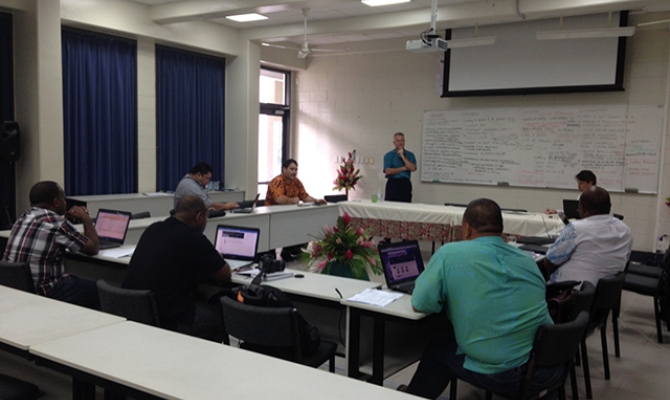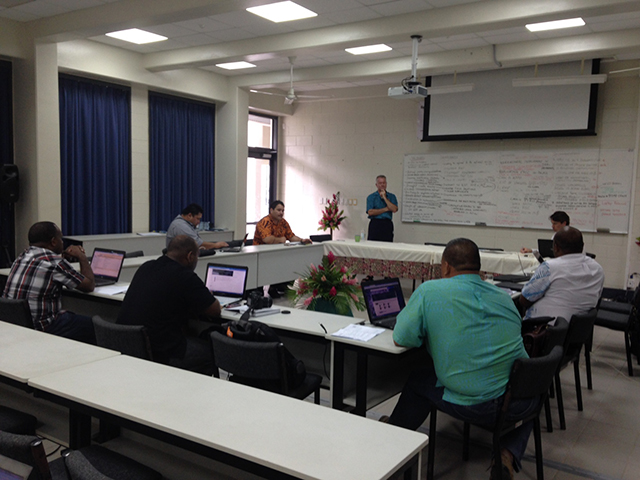
Climate Change Resilience
A set of seven recommendations to improve the regional response to climate change have been agreed to following a regional meeting of Pacific island nations in Samoa on 26-27 February, 2015. The meeting, which took place at the Apia headquarters of the Secretariat of the Pacific Regional Environment Programme (SPREP), is one of a series of Climate Vulnerable Forum workshops currently being convened though to June 2015 in Africa, Asia, Latin America and the Middle East.
The Climate Vulnerable Forum regional event for the Pacific, which focused on improving response to climate change for Pacific Small Island Developing States (SIDS), was organised by SPREP with support from the United Nations Development Programme (UNDP). Participating Governments included Cook Islands, Fiji, Nauru, Palau, Samoa, Solomon Islands, and Climate Vulnerable Forum members Tuvalu and Vanuatu.

The seven recommendations aimed at stimulating national, regional and global advances stemmed from the event's review of challenges, gaps and success stories in Pacific small island nations' experience in dealing with climate change:
1. Accelerate progress towards Green Climate Fund readiness.
2. Enhance private sector involvement in realising action to adapt to climate change and reduce emissions.
3. Promote evolution in climate financing approaches to suit the special case of Pacific SIDS.
4. Increase support for national institutional capacity to take action on climate change.
5. Ensure national action plans are developed and reviewed on a bi-partisan, national stakeholder consensus basis, and in dialogue with development partners.
6. Embed life-cycle sustainability into all climate projects, addressing long-term maintenance challenges.
7. Systematically review possibilities to combine national projects into multi-country initiatives.
Speaking at the closing session of the regional event, Assistant Secretary for Foreign Affairs of Tuvalu, Pasuna Tuaga said:
"I believe we have learnt a lot during the Forum. We will take these messages back to our capitals and look forward to similar knowledge sharing exercises in the future. We all know that our small islands will continue to be battered by climate change and we know adaptation is a priority, but we must also give emphasis to mitigation. This is really important for us. Even though we are not contributing so much to carbon emissions, everyone should play their part."
Mr. Patrick Aroika, of the Ministry of Agriculture of the Cook Islands, also a participating delegate, commented that:
"What we take away from the Forum is that the richness of the information we have to share has grown. Not only are we putting up on the wall gaps and needs but we are also sharing our experiences on how we dealt with those challenges and how we can better see a way forward. We are looking at having more quality delivery on our programmes and projects in the Pacific and based on the lessons learnt that we have captured we're going to continue to improve on that."
Speaking at the conclusion of the event, UN Resident Coordinator and UNDP Resident Representative in Samoa, Ms. Lizbeth Cullity, said:
"The experience gained in this room is highly significant and extremely valuable. Regional climate change programmes didn't exist 20 years ago, so you are the pioneers. What we do with that and where we go from here is very important."
Also speaking at the regional event, Deputy Director General of SPREP, Mr. Kosi Latu, further commented that:
"It's been a busy time for all of us. This Forum has been an excellent opportunity for you to not just look at your challenges and gaps and needs, but more importantly how we take this forward. These challenges are not new, they have been with us for many, many years. But I take comfort in the fact that we have decades of experience. We may not have got it right all the time, but this is how we learn: we learn from experience. And I hope that you will take that experience and help us to develop better approaches."
The regional event is the Pacific input to a global consultation of the Climate Vulnerable Forum being held in June 2015 where the conclusions of all regional meetings will be reviewed together to inform the Forum's forward communications and activities.
The Workshop's concluding recommendations were additionally presented to the informal Pacific Region Development Partners for Climate Change meeting held in Suva, Fiji on 2 March, 2015.
This article was prepared by Matthew McKinnon (UNDP) and has been re-published with permission.
UNDP provides support to the Climate Vulnerable Forum through a dedicated global project and, separately through its Multi-Partner Trust Fund Office, UNDP administers the Climate Vulnerable Forum Trust Fund whose implementing partners include the International Organization for Migration (IOM), UNDP, the United Nations Office for Disaster Risk Reduction (UNISDR) and the World Meteorological Organization (WMO).
The Climate Vulnerable Forum regional event for the Pacific, which focused on improving response to climate change for Pacific Small Island Developing States (SIDS), was organised by SPREP with support from the United Nations Development Programme (UNDP). Participating Governments included Cook Islands, Fiji, Nauru, Palau, Samoa, Solomon Islands, and Climate Vulnerable Forum members Tuvalu and Vanuatu.

Discussions taking place at the Climate Vulnerable Forum event in Apia. Photo: Mina Weydahl / UNDP
The seven recommendations aimed at stimulating national, regional and global advances stemmed from the event's review of challenges, gaps and success stories in Pacific small island nations' experience in dealing with climate change:
1. Accelerate progress towards Green Climate Fund readiness.
2. Enhance private sector involvement in realising action to adapt to climate change and reduce emissions.
3. Promote evolution in climate financing approaches to suit the special case of Pacific SIDS.
4. Increase support for national institutional capacity to take action on climate change.
5. Ensure national action plans are developed and reviewed on a bi-partisan, national stakeholder consensus basis, and in dialogue with development partners.
6. Embed life-cycle sustainability into all climate projects, addressing long-term maintenance challenges.
7. Systematically review possibilities to combine national projects into multi-country initiatives.
Speaking at the closing session of the regional event, Assistant Secretary for Foreign Affairs of Tuvalu, Pasuna Tuaga said:
"I believe we have learnt a lot during the Forum. We will take these messages back to our capitals and look forward to similar knowledge sharing exercises in the future. We all know that our small islands will continue to be battered by climate change and we know adaptation is a priority, but we must also give emphasis to mitigation. This is really important for us. Even though we are not contributing so much to carbon emissions, everyone should play their part."
Mr. Patrick Aroika, of the Ministry of Agriculture of the Cook Islands, also a participating delegate, commented that:
"What we take away from the Forum is that the richness of the information we have to share has grown. Not only are we putting up on the wall gaps and needs but we are also sharing our experiences on how we dealt with those challenges and how we can better see a way forward. We are looking at having more quality delivery on our programmes and projects in the Pacific and based on the lessons learnt that we have captured we're going to continue to improve on that."
Speaking at the conclusion of the event, UN Resident Coordinator and UNDP Resident Representative in Samoa, Ms. Lizbeth Cullity, said:
"The experience gained in this room is highly significant and extremely valuable. Regional climate change programmes didn't exist 20 years ago, so you are the pioneers. What we do with that and where we go from here is very important."
Also speaking at the regional event, Deputy Director General of SPREP, Mr. Kosi Latu, further commented that:
"It's been a busy time for all of us. This Forum has been an excellent opportunity for you to not just look at your challenges and gaps and needs, but more importantly how we take this forward. These challenges are not new, they have been with us for many, many years. But I take comfort in the fact that we have decades of experience. We may not have got it right all the time, but this is how we learn: we learn from experience. And I hope that you will take that experience and help us to develop better approaches."
The regional event is the Pacific input to a global consultation of the Climate Vulnerable Forum being held in June 2015 where the conclusions of all regional meetings will be reviewed together to inform the Forum's forward communications and activities.
The Workshop's concluding recommendations were additionally presented to the informal Pacific Region Development Partners for Climate Change meeting held in Suva, Fiji on 2 March, 2015.
This article was prepared by Matthew McKinnon (UNDP) and has been re-published with permission.
UNDP provides support to the Climate Vulnerable Forum through a dedicated global project and, separately through its Multi-Partner Trust Fund Office, UNDP administers the Climate Vulnerable Forum Trust Fund whose implementing partners include the International Organization for Migration (IOM), UNDP, the United Nations Office for Disaster Risk Reduction (UNISDR) and the World Meteorological Organization (WMO).